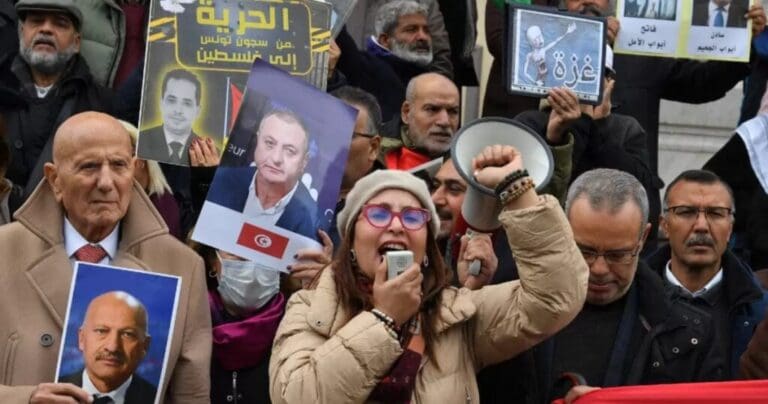In a powerful show of defiance, citizens took to the streets to protest against what they describe as the “authoritarian excesses” of President Kais Saied.
On January 14, a frustrated crowd flooded Habib Bourguiba Avenue in Tunis, demanding the release of political prisoners and denouncing President Saied’s oppressive measures. This rally, organized by the National Salvation Front (FSN), marked a significant moment of resistance, highlighting ongoing public frustration in the wake of the Arab Spring.
Habib Bourguiba Avenue, historically significant as the site of past uprisings, again became a focal point for demonstrators. Despite heavy police presence, the crowds remained resolute, chanting slogans for freedom such as “Freedom!” and “Faithful to the blood of the martyrs!”—echoes of the sacrifices made during the 2011 uprising. Protesters held up images of imprisoned political figures, including former Prime Minister Ali Larayedh and jurist Jawhar Ben Mbarek, condemning arbitrary arrests and the escalating repression of dissent.
Since 2021, President Saied has altered the commemorative date of the uprising’s beginning from January 14 to December 17, the date of Mohamed Bouazizi’s self-immolation. While the change was intended as a tribute, it has ignited debate among the public. Many Tunisians view January 14 as the true day of the regime’s overthrow, symbolizing national unity against oppression, and perceive the new date as an attempt to rewrite history and shift collective memory.
Concern over authoritarian drift
Critics of Saied’s administration point to a concerning trend toward authoritarianism. According to the NGO Human Rights Watch, over 170 individuals are currently incarcerated for their political beliefs or for exercising their right to free expression. Since his coup in 2021, President Saied has implemented drastic measures, dismantling checks and balances while intensifying repression against activists, journalists, and trade unionists. Freedoms and human rights are increasingly under threat, raising alarms among advocates for public liberties.
For many Tunisians, January 14 symbolizes hope for a brighter future characterized by justice and dignity. However, disillusionment is palpable fourteen years after Ben Ali’s ousting. “We believed in real change, but now we feel betrayed,” lamented a protester, his expression filled with anger and frustration. Aspirations for a more equitable and free Tunisia seem to diminish as the government’s excesses become more pronounced.
Despite the challenges, the determination of the protesters on Bourguiba Avenue remains unwavering. The songs of revolt are undiminished, and the resolve to safeguard the achievements of the 2011 revolution is stronger than ever. “We will continue to fight,” declared another participant, “until freedom and justice are genuinely restored.” January 14, 2025, could represent another critical juncture in this ongoing struggle, but for now, Tunisians are resolute in their refusal to allow their hard-earned gains to be erased.
MK/ac/Sf/fss/abj/APA


